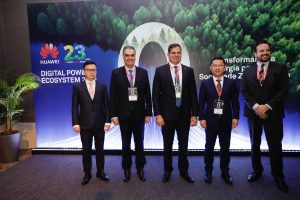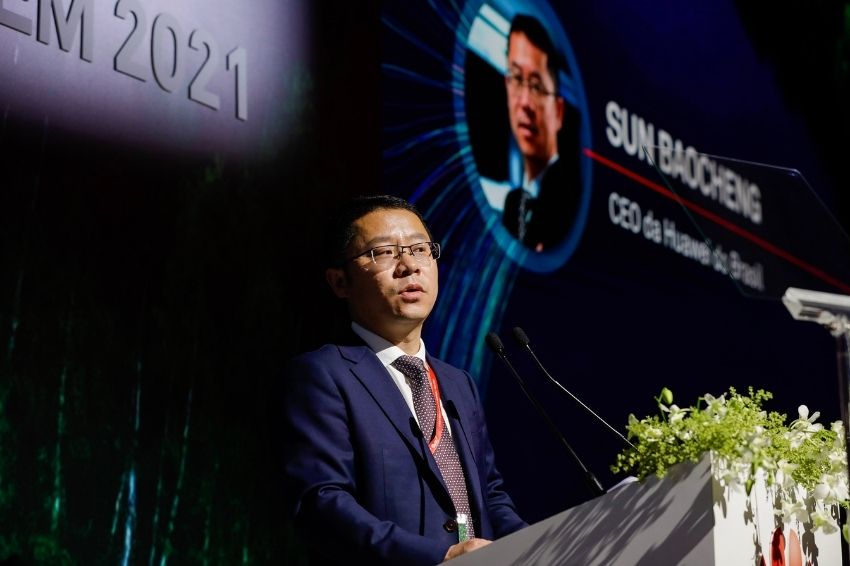Huawei Brasil promoted, this Monday (29), the Huawei Digital Power Ecosystem 2021 at Palácio Tangará, in São Paulo (SP), with the aim of presenting intelligent solutions for the electricity sector.
The event was attended by representatives from ANATEL (National Telecommunications Agency), the ANEEL (National Electric Energy Agency) and consultancy Greener. Canal Solar was on site and covered the event.
For just over eight hours, the speakers spoke about the digital transformation in the sector and the importance of promoting new solutions for the generation of renewable sources – especially solar – aiming for economic development that is neutral in carbon emissions.
The company also presented Huawei Digital Power (a new subsidiary to integrate the company's digital technologies), in addition to: embedded artificial intelligence solutions for the energy sector; case studies showing the benefits of string inverters to improve the safety and efficiency of photovoltaic plants; solutions for zero-carbon data centers, 5G infrastructure, smart grids and energy storage.
“We want to bring all the software intelligence into the energy market (solar, mainly), which still operates in a very mechanical way, with hardware and connections. Where is artificial intelligence? We have a lot of room to advance and we need it to lower prices and increase system efficiency,” said Humberto Cravo Neto, vice president of Huawei Digital Power in Brazil.
In the company's understanding, in the future, energy generation, transmission, distribution, consumption and storage will all be built based on digital technologies. “Today, we are very focused on the solar energy segment, because we believe that this is the future. Other sources, such as wind, have already reached a saturation point and solar still has a lot of room for development,” said Neto.
The executive also revealed that, currently, the company has focused its efforts on BEES storage solutions and that, in the future, it will present dedicated inverters for homes, with triple charger outputs. One of the new features presented was Huawei FusionSolar, focusing on intelligent energy generation, storage and consumption with several active security features. The system has optimizers, a storage solution and safety functions such as AFCI (arc detection) and Rapid Shutdown (quick string shutdown).
Memos
The Huawei event also featured the signing of memorandums with partner companies. Among the documents, the most prominent celebrated the partnership with the Rio Alto Group for the generation of 1.4 GW of clean energy at the Santa Luiza photovoltaic plant.
“It is Huawei's biggest global deal outside of China and we are very proud. It is a partner that includes the supply of our inverters and transformers. All artificial intelligence and other solutions are also included in this agreement”, said Neto.
The executive commented that the company believes that today there is a space of ten years for exponential growth in the part of centralized solar generation in Brazil and revealed that the supply of new solutions with the Rio Alto Group began to occur at the beginning of 2022. “We There is already a delivery deadline for the inverter part of 90 days and for the entire transformer part of 230 days”.
Special participations
The event was also attended by important names in the energy sector, such as André Pepitone, president of ANEEL, Carlos Baigorri, advisor to Anatel, federal deputy Lafayette de Andrada, responsible for reporting on the PL 5829 in the Chamber of Deputies, and economist Ricardo Amorim.
In his speech, Pepitone highlighted Brazil's potential for renewable energy generation and reinforced the need for changes in regulation to facilitate consumer access to distributed generation technologies in their own homes.
According to the president of ANEEL, by 2030, hydroelectric plants should represent only 50% of the energy generated in the country. Today, this total is 85%. “We can be more efficient, a roof can be used to generate energy,” he said. “We are going through a revolution in the energy sector, moving from the consumer era to the customer era”, he highlighted.


















